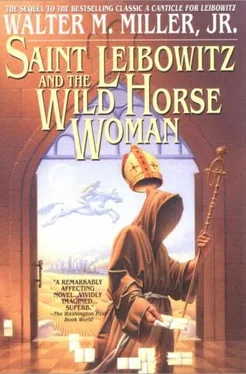It was late afternoon when they reached the river. Blacktooth didn’t know what it was at first. The crowd piled up on itself, then started milling, turning. There was fire to the west, and fire to the north as well. There was a scuffle, a swift panic, and Hair-Puller was lost in the crowd. Once Blacktooth thought he heard the familiar creak of the wagon, then lost it again. Luckily he had managed to save his jail blanket.
It was getting dark. Except for a few children crying, the refugees were silent again, milling in place, making decisions through some sort of slow, visceral process, like a worm. The main stream turned south, following the bank of the river out of the city. Suspecting what it was that had turned them, Blacktooth climbed a low stone wall. A few others, like himself, stood on top, looking at the Great River.
Blacktooth had never seen, or even imagined, so much water before. It was a different substance than the water he had known in the mountains or on the Plains. It didn’t dance, or swirl, or fall. It lay like a sheet of muddy glass, half brown and half silver. It was a plain of water. He thought he could walk across it, but he knew better.
Squeezing past the others, Blacktooth walked along the top of the wall to a fallen pier at the water’s edge. Boats were standing off shore. He hadn’t seen many boats before, just the flat-bottomed ferries on the Red, but he knew what they were. These were barges, some with sheds built with chimneys and window glass, and long sweeps that turned them and moved them on the water. People on the decks and roofs watched the city burn. The boats made small circles in the current, watching the fire, perhaps waiting to move in later to loot. A few farmer refugees tried to swim or wade out to the boats, but they were beaten away with the sweeps.
A few shots were fired. The people on the barges were dressed in rags, the same as the farmers, but Blacktooth assumed they were from the other shore.
The fire was getting closer. From the water, it was almost beautiful: fire, loveliest of the four elements of the world, and yet an element too in Hell. Blacktooth found a spot at the end of the pier, and wrapped himself in his jail blanket; paradoxically, it kept him cool. Beneath the wall of smoke and flame, he could see the stream of refugees heading south along the riverbank.
“So many,” Blacktooth muttered. The man standing beside him grunted what sounded like assent. He was holding a long gun, but not a repeater. It was the type that fired stones through a thick iron barrel. For some reason, Blacktooth felt safe beside him. He had no desire to rejoin the refugees and head south.
“They could have defended the city,” Blacktooth whispered, and the man grunted again. They could have, Blacktooth thought, but they hadn’t wanted to. New Rome wasn’t their city. They had been driven there by the Texark soldiers and then driven out by the flames. Few were armed, and those with very ancient weapons, of the kind that had killed the sharf’s shaman.
Perhaps the man standing beside him had fired the shot.
The howling wind was whipping the water into whitecaps. It was blowing from the east, sucked into the city by the flames. As night fell the flood of refugees lessened to a stream, and then to a trickle, all turning south along the riverbank, heading toward Texarkana, as if drawn by some ancient, instinctive urge. Late that night their fires could be seen in the low line of wooded bluffs to the south. By then Blacktooth was asleep. He slept for hours, alone at the end of the pier. By daylight the fire had almost died away.
And the Holy City of New Rome was burned.
The smell of food awakened him. Blacktooth had slept wrapped in his jail blanket, propped against a wooden upright at the end of the pier. If the fire had kept coming it would have followed the pier to him, and consumed him along with the rest of the world. But he had been spared. He had taken off his boots and hidden them under his blanket; they were still there, as was his zucchetto, with three pills left. As soon as he sat up, he felt Hilbert’s fever returning. But couldn’t it be hunger? He hadn’t eaten in days.
He smelled fish cooking. At the end of the pier, a boat was tied up on the muddy bank. A group of men were gathered around a small fire. Blacktooth stood up, pulling the blanket around him to hide his monk’s robes. These boatmen were probably less Christianized even than the Grasshopper farmers, who were themselves barely Christian at all. And he remembered his jailer’s remark, that the Antipope was burning the city.
Something in the shape of the group, their stance or the tone of their voices, told Blacktooth that he could join them safely. Still, he edged in cautiously, walking slowly along the edge of the wooden pier.
A body floated by, buoyed by its own gases. A woman’s face smiled upward toward a scrim of smoke and sky. Blacktooth looked away and stepped onto the mud. Someone passed him a piece of fish, wrapped in big soft leaves. The smell of it was so overpowering, so delicious, that he had to sit down to eat it. No one paid any attention to him or asked him any questions. The men by the fire seemed united by a sort of rough charity; they were boatmen, and spoke a version of Ol’zark that Blacktooth could barely make out. The outsiders, two or three stragglers like himself, spoke not at all. Their silence seemed to be essential to the rough peace that prevailed.
After he had finished the fish, Blacktooth looked around. Now that the smoke had cleared he could see the big towers of the ancient bridge. He could make out low bluffs on the far side. The water was impossibly wide. The Great River, the Misspee, flowed into the sea; how big, then, must the sea be? Already this was more water than Blacktooth had ever imagined.
“The Nomads coming,” said one of the boatmen. The word for Nomad in their dialect was “horsepeople.” The implication was, so we ourselves must flee!
There were no women among the boatmen; but even as Blacktooth was noticing this, several women walked down the bank, trudging from rock to rocky step, tracking ash and carrying armloads of what looked like rags onto the barge and into the shed/cabin. They were followed by other women with bags that clinked; perhaps crockery?
Someone passed Blacktooth another piece of fish, followed by a pot of warm water which seemed to be some kind of weak tea. “The Nomads are coming,” said another woman, arriving at a run. The “horsepeople.”
There was a shout, and Blacktooth and the other “guests” stood back while one of the boatmen scattered the fire with a stick. Before Blacktooth realized what was happening, the barge was spinning off in the current. The other “guests” by the dead fire quickly scattered— and Blacktooth found himself holding the boatmen’s water pot, alone again. It was just as well. For the first time in days, he felt his bowels calling, so it was with pleasure that he found a hidden place by the water’s edge under the pier and took a dump, and then cleansed himself and went into the city.
Blacktooth assumed that the Grasshopper warriors would arrive as soon as the fire burned out, and begin looting and raping, and with them would come Brownpony and the Curia. But it was noon and the streets were still empty. He had rolled up his jail blanket, and now he felt exposed and vulnerable in his habit and zucchetto as he walked the right angles of the streets waiting for the Nomads to find him and take him to Brownpony.
No one came. It was as if the Holy City had been cleansed. Even the corpses in the street, blackened like cinders, seemed cleansed somehow, as if the fire had swept away their corruptions leaving only a purified husk.
There wasn’t much to loot. The fire had consumed everything but the brick and stone, reducing the city back to the rubble it must have been before the Harq-Hannegans had rebuilt it. How many times had these bricks fallen? Blacktooth wondered. How many conquerors had passed under this lintel, this stone? The Holy City with its grid of streets between blackened piles of rubble and shells of burned buildings was like a palimpsest of civilization and misery, all intermixed and intermingled, one age falling onto the other like leaves; like cotton wood trash, the debris of centuries good only for a twenty-minute or a twenty-hour fire.
Читать дальше








